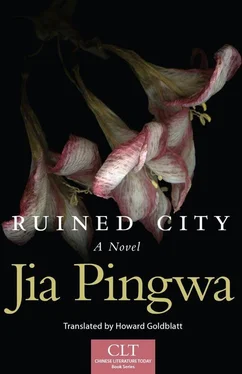“You’ll probably shriek in admiration when you see the abbess later,” Zhuang said.
A crowd had gathered at the registration area when they arrived; an old nun was sitting behind a desk covered with writing brushes, ink, and a book with rice paper pages. Meng introduced Zhuang to her, eliciting cries of surprise from her and several nearby monks. Huiming came out through a small round door, which drew a gasp from Li Hongwen, as predicted by Zhuang, who reached out to shake her hand; she responded with a Buddhist greeting and invited them inside. It was a small, clean compound, with two rooms to the north; she led them into one. They were served tea.
“We are honored by your visit,” she said to Zhuang. “I was worried you might not accept my invitation.”
“How could I stay away from something this important? Congratulations.”
“Why don’t you go meet the provincial and municipal leaders?”
Before Zhuang could ask who they were, she took him into a suite with a circle of black straight-backed chairs with apricot-yellow cushions. Cigarettes and used teacups were strewn across the top of a black lacquered tea table inlaid with strips of patterned Lantian jade that sat in the middle of the room.
“Let me make the introduction, honored leaders. This is the celebrated writer Zhuang Zhidie.”
“We all know who he is,” they said, reaching out to shake Zhuang’s hand. He knew some of them — the chair of the Provincial Ethnic Affairs Commission, the head of the Bureau of Civil Affairs, Huang Defu, and the secretary-general of the Municipal Party Committee. After shaking hands, Zhuang walked up to Huang Defu.
“Is the mayor coming?” he asked.
“He had an important meeting and sent me as his representative.”
“I saw his license plate and thought he must be here. Getting all of you here is quite a coup.”
“This is the temple’s first major event.”
“What great thing are you working on these days?” the secretary-general asked, but Zhuang ignored him and continued his conversation with Huang.
“How are you doing?”
“Fine. How about you? How’s your foot? I hear it was healed by an unlicensed doctor.”
“Yes, he was really good. Two plasters and I’m fine.” Zhuang turned to see the secretary-general lean forward, ready to shake his hand. But, still pretending not to notice him, Zhuang said something to Huang before going back to his seat. Picking up his cup to sip tea, Zhuang glanced at the secretary-general out of the corner of his eye; the man was still standing there, his outstretched hand suspended for a while before he curled his fingers and said to someone beside him, “It’s Wednesday today; it’ll be Thursday tomorrow and Friday the day after.”
Zhuang spotted Meng waving to him from the door, so he walked over.
“Huiming is busy today. She said she can’t receive everyone properly and asked me to take care of you. She gave me six coupons for a meal here after the ceremony. They serve vegetarian fare, but the dishes are unique, so you may want to try them.”
“Too many people and too much going on to enjoy a good meal. Why don’t we go for some spicy noodles? They can cool you off on a hot day like this,” Zhuang offered.
“Sounds good. I’ll take them to see the congratulatory scrolls. It’s about time for the ceremony to start. Want to come with us? You’ll have to sit onstage with the leaders.”
“That secretary-general is here, too. I ignored him earlier, but I’d be out of bounds if I ignored him when I’m up there with them. What will the ceremony be like?”
“First a brief gathering at the entrance, with music and firecrackers, followed by Master Xingyun of the Famen Temple, who will announce Huiming’s assumption as abbess. Then will come speeches by the leaders and representatives from various temples and religious sects. The assumption ceremony in the Buddhist tradition will take place last.”
“I’m not going to the gathering, but I will stick around for the ceremony.”
“I’ll go tell them to look around on their own, and we’ll meet at the gate later. Wait for me at the hall. I want to show you something you will definitely like.”
Zhuang went to Shengmu Hall to look at the statues. A large ringed cauldron, filled with incense ash, stood in the front, behind an iron rack more than a dozen feet long, into which holes were drilled at four-inch intervals. Swarms of worshippers were burning incense and lighting candles to fill the holes, sending soft red wax dripping everywhere. The air was too acrid for Zhuang, so he walked out to look at the small pavilions on either side of the hall. He first went to the one on the east, where a stone stele detailed how Yang Yuhuan had become a nun here before she was chosen to enter the palace, and how Emperor Xuanzong of the Tang dynasty had come here to worship the Buddha and burn incense. He smiled, knowing that it had all been made up by Meng Yunfang, and walked across the pavilion to the west. Just then, Meng came over with Wan’er. Her face was even lovelier from the sweaty heat; she said she had been to every hall, and asked him why there were so many monks at a nunnery, not to mention an orchestra whose members were all monks and nuns. Did they play musical instruments?
“There are only thirteen nuns here, not enough for a major event like this. The others have come from temples,” Meng said. “I borrowed the orchestra from Ruan Zhifei. They dressed up like monks and nuns to show their respect for the solemnity of the occasion. Based on your train of thought, there will be lots of ‘affairs’ here with so many monks in a nunnery.”
“Is the stele in the pavilion your work, Meng?” Zhuang asked. “It’s a bald-faced lie. What proof do you have for Emperor Xuanzong’s visit?”
“What proof do you have that he didn’t come?” Meng retorted while leading him to the pavilion to the west. “Look at this, this is the real thing. The nunnery once had a rare beauty who became a nun.”
Zhuang took a closer look at the smaller stele and read the inscription:
Epitaph for Ma Lingxu, a nun from the Shengwu Temple at Dayan
Drafted by Li Shiyu, Vice President of the Board of Punishments, and inscribed by Liu Taihe, a commoner
The Taoist lady is called Lingxu, surnamed Ma, from Weinan. With tender skin and a graceful manner, she had a unique aura, a pure heart, and a gentle nature, sparkled like a mirror, and was as fragrant as an orchid. She could roll her long sleeves seven times, and her exquisite singing lingered for three days. She strummed an instrument and sent cranes dancing, played a bamboo pipe to make a dragon sing. Although she learned to sing from tutors, she was so talented that she put the girl from Wu to shame and demoralized the girl from Han. Her fame was not limited to that place, for she was well known in the south also. Things changed in the world, and her heart ceased to beat. Leaving the world, she was included in the roster at the celestial palace. A woman made up for the one she loved, she sought to be with the gentleman. Of the thirteen shrines in the Tianbao reign, she was enshrined in the Kaiyuan Temple, returning to Master Dugu on the first day of the lunar year during the Shengwu reign. The pure jade was pinned back on the robe, while the green pine stood alone. Knowing the past like the deities, I could tell the secrets behind everything. But things did not turn out the way I wanted, and I spent three years with no results. My heart knew where it belonged, and a glance was good enough. Pleasant talk and laughter to accompany my friend went with the zither. Before the month was out, she died without suffering an illness. As the gentleman said, “A splendid appearance with no substance is a great regret.” Twenty years have passed. My father, Guangqian, was the Xiuning County Head at Xinzhou. He celebrated good deeds and outstanding people, and asked me to draft these humble words to commemorate the lady. The epitaph would read :
Читать дальше


![Matthew Vincent - [you] Ruined It for Everyone!](/books/216429/matthew-vincent-you-ruined-it-for-everyone-thumb.webp)









